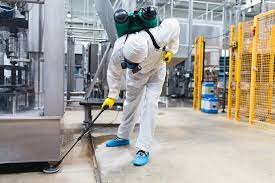Food Manufacturing Pest Control

Food manufacturing facilities are subjected to exacting regulatory standards set forth to guard against contamination of food products. An Integrated Pest Management (IPM) program is the most effective practice employed. However, what does an ideal IPM program look like? How do we identify and address potential pest concerns early on, before they can become a serious problem? How do we keep manufacturers and processors from reacting at the wrong moment and deeming an outbreak of a major crisis?
Effective food manufacturing pest control programs employ strict adherence to food safety guidelines. Guidelines prescribe methods and techniques for preventing pests, including food borne illnesses, from entering or growing within the facility. Proper procedures include emptying non-food contact points, sanitizing and drying equipment, implementing control measures at the source, sealing off rooms that would normally allow insects in, and closing doors to prevent entry. Get to know where to find food packaging pest control near me.
Following guidelines for food manufacturing can be a tall order. Often, manufacturers find themselves on the defense when pests begin to proliferate. It's often up to the individual company to ensure it is doing everything it can to control infestations. But if employees aren't properly trained, or if management isn't properly committed to food safety, the company may not be sufficiently prepared to handle infestations of all types. Companies that don't have the resource to handle food safety issues can fall victim to the many dangers posed by pests. When infestations occur, it's important for operators to call on a food processing and storage firm to take action. The most effective pest control services employ trained personnel that know how to handle situations as they arise. A reputable pest control service should offer services like sanitation, and temperature monitoring for commercial facilities.
These steps aren't always as simple as they sound, especially for smaller operations that rely on a small amount of food processing or storage. In order to handle an infestation, it's important for food processing and storage facilities to call on the services of a pest control expert. A qualified professional can identify specific pests and learn the best way to address them. They can also provide advice about food manufacturing sanitary practices and other solutions. And they can help ensure that pests don't end up gaining a foothold in a facility. By keeping the company's food production sanitary and free from pests, the operator can help ensure that it continues to operate. If you're worried about food manufacturing related pest problems, contact a pest control expert today. They'll provide you with the assistance you need to address the issue and keep your operation running smoothly. Because pest control experts know the ins and outs of food manufacturing environments, they can help ensure that a pest infestation is handled properly and completely. So call today to find out more about how pest control experts can help you keep your food processing and storage facility running efficiently. Check out this post for more details related to this article: https://en.wikipedia.org/wiki/Food_processing.
